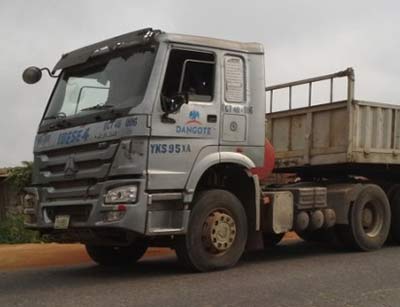Business
Tragedy And The Dangote Truck Empire

BY GBOGBOWA GBOWA
In Nigeria, the name Dangote Group of Industries, otherwise commonly referred to as Dangote is etched into the fabric of everyday life. From cement to sugar, salt to flour, the conglomerate’s products are essential to the nation’s economy. But alongside this industrial dominance rides a darker legacy—one forged not in boardrooms, but on blood-stained highways.
But for many Nigerians, the sight of a Dangote-branded trailer evokes not pride, but dread. Over the years, the Dangote fleet has become synonymous with tragedy. So frequent are the accidents involving these trucks that the phrase “Dangote killer” has entered the national lexicon—a grim nickname born from grief and outrage.
From Lagos to Enugu, from Edo to Kaduna, from Kogi to Maiduguri, stories abound of lives cut short, families shattered, and futures erased under the crushing weight of these industrial behemoths.
The latest tragedies in Enugu and Edo State have reignited public outrage, forcing Nigerians to confront a question that has lingered too long: How many more lives must be lost before accountability takes the wheel?
On September 3, 2025, a truck bearing the Dangote logo collided with a vehicle at Four Corner Junction in Enugu State, killing an entire family. Eyewitnesses described the scene as “horrific,” with the victims trapped in a mangled car engulfed by fire. Hours later, another cement-laden truck crushed a tricycle on the same expressway, killing four more people.
Just days earlier, Ruth Otabor, the younger sister of Big Brother Naija winner Phyna, died after being struck by a Dangote truck near Auchi Polytechnic. Her leg had been amputated following the crash, and despite efforts to fly her abroad for treatment, she succumbed to her injuries.
These are not isolated incidents. In April 2024, a Dangote truck collided with a Toyota Hiace bus on the Okene-Lokoja highway, killing 19 people. The pattern is unmistakable. The grief is unrelenting.

In response to the Enugu accident, Dangote Group of Industries issued a statement distancing itself from the truck, claiming it was operated by Visco Investment Global Limited—a supposedly third-party contractor. The company expressed concern over the unauthorized use of its logo and promised tighter controls on brand identity.
But for many Nigerians, this explanation rings hollow. Whether or not the trucks are directly owned by Dangote, they bear its name, its logo, and its reputation. And when those trucks kill, the public sees not Visco or any subcontractor, they see Dangote.
The company insists it is committed to safety and corporate responsibility. It has reportedly covered medical costs for victims and pledged to cooperate with investigations.
But critics argue that these gestures fall short of systemic reform. The real issue, they say, is not just branding, it is accountability. The recurring carnage has sparked calls for a nationwide audit of all Dangote-branded vehicles, regardless of ownership.
With the Dangote Refinery in Lagos and the additional trucking system for distribution of fuel within and outside the country, concerns are heightening about the fate of Nigerians in a system that is largely a respecter of persons, and unwilling to strengthen the rules nor enforce compliance.
Activists demand stricter regulation of haulage operations, mandatory driver training, and transparent investigations into every fatal crash. Some have even proposed a public registry of third-party operators affiliated with major logistics brands.
Social media has become a battleground for grief and protest. “When will enough be truly enough with Dangote trucks and their reckless drivers?” wrote activist Charles Ogbu. The sentiment is echoed across platforms, where videos of accident scenes circulate alongside demands for justice.
Nigeria’s roads should not be death traps. And no brand, no matter how powerful should be immune to scrutiny. The Dangote Group, as a symbol of industrial might, must also become a symbol of ethical leadership. That means not just distancing itself from tragedy, but actively preventing it.
Until then, the phrase “Dangote killer” will remain a haunting indictment—not just of a fleet, but of a system that allows profit to outrun accountability.

























